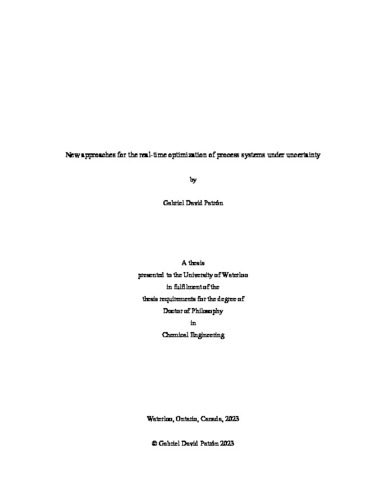| dc.description.abstract | In the process industry, the economical operation of systems is of utmost importance for stakeholders to remain competitive. Moreover, economic incentives can be used to drive the development of sustainable processes, which must be deployed to ensure continued human and ecological welfare. In the process systems engineering paradigm, model predictive control (MPC) and real-time optimization (RTO) are methods used to achieve operational optimality; however, both methods are subject to uncertainty, which can adversely affect their performance. Along with the challenges of uncertainty, formulations of economic optimization problems are largely problem-specific as process utilities and products vary significantly by application; thus, many nascent processes have not received a tailored economic optimization treatment.
In this thesis, the focus is on avenues of economic optimization under uncertainty, namely, the two-step RTO method, which updates process models via parameters; and the modifier adaptation (MA) method, which updates process models via error and gradient correction. In the case of parametric model uncertainty, the two-step RTO method is used. The parameter estimation (PE) step that accompanies RTO requires plant measurements that are often noisy, which can cause the propagation of noise to the parameter estimates and result in poor RTO performance. In the present work, a noise-abatement scheme is proposed such that high-fidelity parameter estimates are used to update a process model for economic optimization. This is achieved through parameter estimate bootstrapping to compute bounds and determine the measurement-set that results in the lowest parameter variation; thus, the scheme is dubbed low-variance parameter estimation (lv-PE). This method is shown to result in improved process economics through truer set points and reduced dynamic behaviour.
In the case of structural model mismatch (i.e., unmodelled phenomena), the MA approach is used, whereby gradient modifier (i.e., correction) terms must be recursively estimated until convergence. These modifier terms require plant perturbations to be performed, which incite time-consuming plant dynamics that delay operating point updates. In cases with frequent disturbances, MA may have poor performance well as there is limited time to refine the modifiers. Herein, a partial modifier adaptation (pMA) method is proposed, which selects a subset of modifications to be made, thus reducing the number of necessary perturbations. Through this reduced experimental burden, the operating point refinement process is accelerated resulting in quicker convergence to advantageous operating points. Additionally, constraint satisfaction during this refinement process can also result in poor performance via wasted below-specification products. Accordingly, the pMA method also includes an adjustment step that can drive the system to constraint-satisfying regions at each iteration. The pMA method is shown to economically outperform both the standard MA method as well as a related directional MA method in cases with frequent periodic disturbances.
The economic optimization methods described above are implemented in novel processes to improve their economics, which can incite further technological uptake. Post-combustion carbon capture (PCC) is the most advanced carbon capture technology as it has been investigated extensively. PCC takes industrial flue gases and separates the carbon dioxide for later repurposing or storage. Most PCC operating schemes make decisions using simplified models since a mechanistic PCC model is large and difficult to solve. To this end, this thesis provides the first robust MPC that can address uncertainty in PCC with a mechanistic model. The advantage of the mechanistic model in robust optimal control is that it allows for a precise treatment of uncertainties in phenomenological parameters. Using the multi-scenario approach, discrete realizations of the uncertain parameters inside a given uncertainty region can be incorporated into the controller to produce control actions that result in a robust operation in closed-loop. In the case of jointly uncertainty activity coefficients and flue gas flowrates, the proposed robust MPC is shown to lead to improved performance with respect to a nominal controller (i.e., one that does not hedge against uncertainty) under various operational scenarios.
In addition to the PCC robust control problem, the mechanistic model is used for economic optimization and state estimation via RTO and moving horizon estimation (MHE) layers respectively. While the former computes economical set points, the latter uses few measurements to compute the full system state, which is necessary for the controller that uses a mechanistic model. These layers are integrated to operate the system economically via a new economic function that accounts for the most significant economic aspects of PCC, including the carbon economy, energy, chemical, and utility costs. A new proposed MPC layer is novel in its ability to enable flexible control of the plant by manipulating fresh material streams to impact CO2 capture and the MHE layer is the first to provide accurate system estimates to the controller with realistically accessible measurements. A joint MPC-MHE-RTO scheme is deployed for PCC, which is shown to lead to more economical steady-state operation compared to constant set point counterfactuals under cofiring, diurnal operation, and price variation scenarios. The lv-PE scheme is also deployed for the PCC system where it is found to improve set point economics with respect to traditional PE methods. The improvements are observed to occur through reduced emissions and more efficient energy used, thus having environmental co-benefits. Moreover, the lv-PE algorithm is used for uncertainty quantification to develop a robust RTO that leads to more conservative set points (i.e., less economic improvement) but lower set point variation (i.e., less control burden).
The methodologies developed in this PhD thesis provide improvements in efficacy as well as applicability of online economic optimization in engineering applications, where uncertainty is often present. These can be deployed by both academic as well as industrial practitioners that wish to improve the economic performance on their processes. | en |

